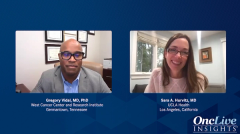
Addressing Unmet Needs in the Management of TNBC
Perspectives on the most prominent unmet needs in metastatic triple-negative breast cancer and how these may be addressed with future clinical trials.
Episodes in this series

Transcript:
Sara A. Hurvitz, MD: Can you kind of highlight for me some areas of unmet need for metastatic triple-negative breast cancer? As you mentioned, it’s a very exciting time, lots of new agents are being evaluated, but where are some key unmet needs in your patients?
Gregory Vidal, MD, PhD: So, certainly new therapies that extend the life of all patients. For example, in KEYNOTE-355, where there was an overall survival benefit for the addition of pembrolizumab, that overall survival was about 23 months. So, those patients still do succumb to their disease within a short period of time, even if we’re getting some benefit. So, certainly, therapies that have more long and durable responses and control of disease are a big unmet need. I have quite a few of patients who progress very rapidly from early therapy. I have not yet seen the full impact of pembrolizumab in the early setting on that population, but we’ve had, and we all do have, the population of patients who go through early therapy, our best therapy and have progression within 6 months. Those patients really don’t do well, so, that’s a group of patients that get excluded from most of our clinical trials. So, we really don’t have or haven’t studied what therapy is most effective in that population. And so, those are similar. The population that I would extend to, which some categorize as being in crisis, and so that population I try to control. Then, the other part of what difficulty I’ve had with our patient is, really in terms of toxicity, microtubule inhibitor is across the board for patients. Neuropathy becomes such a big deal with our patient population, and so, getting sort of different mechanisms of action, drugs, and supported medicines, especially for things like neuropathy, which would then help us to maximize our therapy going forward, is also a big deal.
Sara A. Hurvitz, MD: Absolutely. There are so many areas you highlighted where we need to do better. I was just thinking that we didn’t even mention anthracyclines, this particular patient didn’t even receive an anthracycline, but there are efforts to try and omit or reduce the use of it due to the cardiomyopathy and leukemic toxicity associated with these drugs, which are very active and effective, but in the metastatic setting, certainly not curative. Another area, I think, of unmet need is brain metastases. So many of our patients do have brain metastases with triple-negative breast cancer, and I’m excited by promising data relating to some ADCs [antibody-drug conjugates]—T-DM1, and T-DXd, for example— do appear to have some activity in HER2-positive breast cancer in patients with brain metastases. So, hopefully we’ll begin to see some emerging data relating to CNS [central nervous system] activity of the novel agents that are being evaluated. It’s a really exciting time for us to be involved in clinical research, so, I thinkmy advice to clinicians and the community is, when you have a patient with triple-negative breast cancer, offer them clinical trials, refer them to academic centers to consider clinical trials because, as you mentioned, the survival is so poor with this sub-type of breast cancer. We also need more research for a better understanding of the sub-types because there are some patients who live years with a sort of indolent form of triple-negative breast cancer. So, our ability to distinguish and stratify patients based on their tumor types and prognosis is going to be important as we select patients for trials.
Transcript edited for clarity.




































